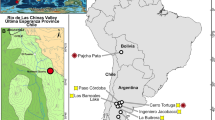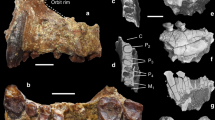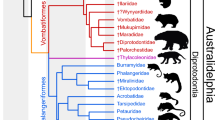Abstract
In April 1978, a fragment of a primate lower jaw containing the second and third molar teeth was found in late Eocene exposures of the Pondaung Hills about 1 mile north-west of Mogaung village in northwestern Central Burma. This approximately 40-Myr-old specimen is the first fossil primate found in Burma since the fragmentary remains of the controversial earliest anthropoids Pondaungia cotteri Pilgrim1 and Ampithecus mogaungensis Colbert2 were recovered more than 50 yr ago. The jaw described here is believed to represent further evidence of P. cotteri. Its recovery from undoubted late Eocene exposures coupled with its salient higher primate characters and excellent state of preservation provides the opportunity to substantiate further that the Pondaung primates of Burma are the earliest known record of the Anthropoidea.
This is a preview of subscription content, access via your institution
Access options
Subscribe to this journal
Receive 51 print issues and online access
$199.00 per year
only $3.90 per issue
Buy this article
- Purchase on Springer Link
- Instant access to full article PDF
Prices may be subject to local taxes which are calculated during checkout
Similar content being viewed by others
References
Pilgrim, G. Mem. geol. Surv. India 14, 1–24 (1927).
Colbert, E. H. Am. Mus. Novit. 951, 1–18 (1937).
Stamp, L. D. Geol. Mag. 59, 481–501 (1922).
Cotter, G. P. Rec. geol. Surv. India 44, 52–84 (1914).
Pilgrim, G. E. & Cotter, G. P. Rec. geol. Surv. India 47, 42–77 (1916).
Colbert, E. H. Bull. Am. Mus. nat. Hist. 74, 255–436 (1938).
Berggren, W. A., McKenna, M. C., Hardenbol, J. & Obradovich, J. D. J. Geol. 86, 67–81 (1978).
Gingerich, P. D. Am. J. phys. Anthrop. 47, 395–398 (1977).
Hylander, W. L. J. Morph. 160, 223–240 (1979).
Beecher, R. M. Am. J. phys. Anthrop. 47, 325–336 (1977).
Simons, E. L. Nature 232, 489–491 (1971).
Dashzeveg, D. & McKenna, M. C. Palaeont. pol. 22, 119–137 (1977).
Gazin, C. L. Smithson. Misc. Colins 144, 1–112 (1962).
Kay, R. F. Am. J. phys. Anthrop. 46, 327–352 (1977).
Maier, W. Z. Morph. Anthrop. 68, 307–344 (1977).
Simons, E. L. Nature 205, 135–139 (1965).
Kay, R. F. in Evolutionary Biology of the New World Monkeys and Continental Drift (eds Ciochon, R. L. & Chiarelli, A. B.) (Plenum, New York, in the press).
Swindler, D. R. Dentition of Living Primates, 1–308 (Academic, New York, 1976).
Szalay, F. S. Nature 227, 355–357 (1970).
Szalay, F. S. Nature 236, 179–180 (1972).
Gingerich, P. D. & Schoeninger, M. J. hum. Evolut. 6, 483–505 (1977).
Szalay, F. S. & Delson, E. Evolutionary History of the Primates (Academic, New York, in the press).
Author information
Authors and Affiliations
Rights and permissions
About this article
Cite this article
Maw, B., Ciochon, R. & Savage, D. Late Eocene of Burma yields earliest anthropoid primate, Pondaungia cotteri. Nature 282, 65–67 (1979). https://doi.org/10.1038/282065a0
Received:
Accepted:
Issue Date:
DOI: https://doi.org/10.1038/282065a0
This article is cited by
Comments
By submitting a comment you agree to abide by our Terms and Community Guidelines. If you find something abusive or that does not comply with our terms or guidelines please flag it as inappropriate.



